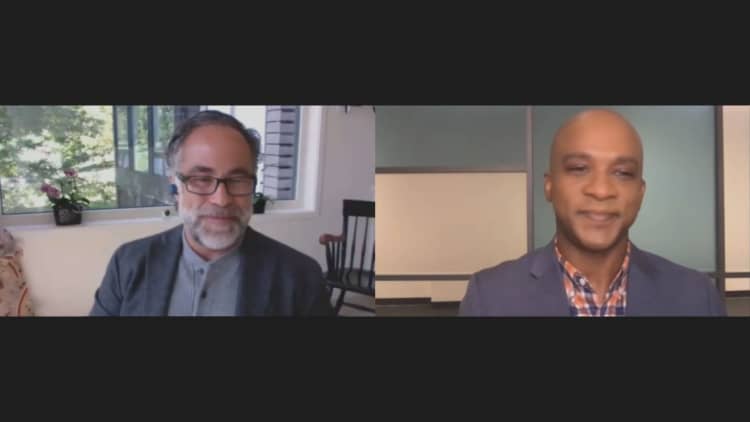
Martin Chavez served in more than one major role during his Goldman Sachs career, including chief financial officer and chief information officer, and those experiences were prime opportunities for the self-described "quant" to learn a valuable lesson about the future of work and technology.
Wall Street will not be run by computer code alone, he says, but the rise of algorithms in financial services is a lesson in why most workers will need to become familiar with computer code if they want to be valuable to their organizations.
"Not everyone needs to be a coder," Chavez said. "The idea of coding is valuable and wonderful, but the idea everyone should learn to code? ... I don't know, but everyone does need to have an algorithmic data, problem-solving mindset. That is a baseline skill for every professional in the workplace, no matter what the role is," the former Goldman Sachs top executive said at a recent CNBC @Work virtual event.
The history of Wall Street compliance departments was one of the early examples from which Chavez learned about the merging of the traditional white-collar professional and techie. Once compliance was run by staffers with all legal and regulatory backgrounds, but as algorithms and trading algos, specifically, became part of what Wall Street firms relied on, Goldman discovered that it needed professionals who could assess whether code was in compliance with laws and regulations.
The bank built a compliance organization at the intersection of computer science and law.
"When people would ask me what to study, I would say a winning combination is comp sci and a law degree, and you will be busy for a long time," Chavez said.
Eventually it spread beyond compliance at Goldman — Chavez witnessed traders and sales people talking past each other as algorithms became more important, and he was part of a team that placed employees with algorithmic, problem-solving skills in between trading and sales.
"And it ended the problem of people talking past each other," Chavez said.
Only when data scientists were living and breathing inside the trading business was Goldman able to build the right software. And "that applies in any business," he said.
While it might not be obvious, Chavez said a similar situation is developing across industries, such as in online retail, where fraud detection is based on algorithms, and showing customers items they might want to buy also is becoming more reliant on computer intelligence.
"If you have one group of people telling another group, 'please build this software for me,' it doesn't work very well. You're talking different languages and talking past each other," he said.
How to learn 'a little bit of code'
This view of code's role in professional employment does not mean every worker needs to become a coder. Rather, it is learning to use code at an elementary level that is going to be useful, maybe critical. It will be harder to become a data-driven problem solver if a person hasn't written "a little bit of code," says Chavez, but he added that the true coder languages, like Java and Python, are not skills that most employees will need to master.
He referenced the rise of low-code and no-code platforms which offer non-computer science professionals a way to bring the coding world into their work. Technology giants including Google, Microsoft and Amazon have been building out low-code platforms. Google bought AppSheet in early 2020 and Amazon unveiled its long-anticipated competitor, Honeycode in June. Many established low-code players, such as Apple-owned Claris, Siemens'-owned Mendix, and Quickbase, continue to find new uses for their software within government and nonprofit settings and across traditional industries including utilities and oil and gas, especially during a pandemic that forced major changes in operations in a hurry, and using digital platforms. No-code start-ups are also seeing increased funding, such as Unqork, which has Goldman Sachs and BlackRock as backers.
Recent usage statistics from Microsoft-owned careers platform LinkedIn bear out the rising importance of this job market "upskilling" as more organizations embrace coding, and more simplified coding options. The number of non-engineers taking beginner level programming courses on LinkedIn Learning grew 568% year over year through August 2020. The LinkedIn course, "Programming Foundations: Fundamentals," saw a user increase of 168% in the past six months, while the number of learners taking courses in Microsoft PowerApps, its proprietary low-code platform, increased 85%.
Chavez says the education should start as early as possible.
"I am teaching my kids ... dragging blocks around on a screen. That is absolutely coding. The tedium of typing in a programming language has been taken away."
For more on influential voices disrupting the next decade of work and finding opportunity in unprecedented times, join the CNBC @Work Summit on Tuesday, October 6.







